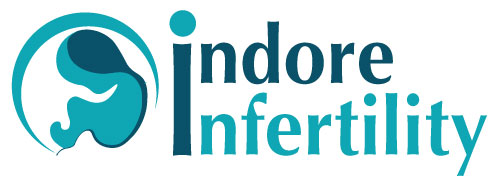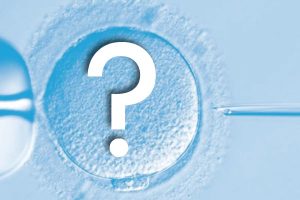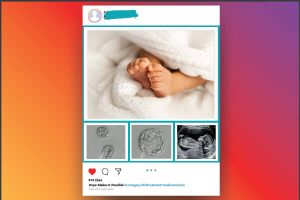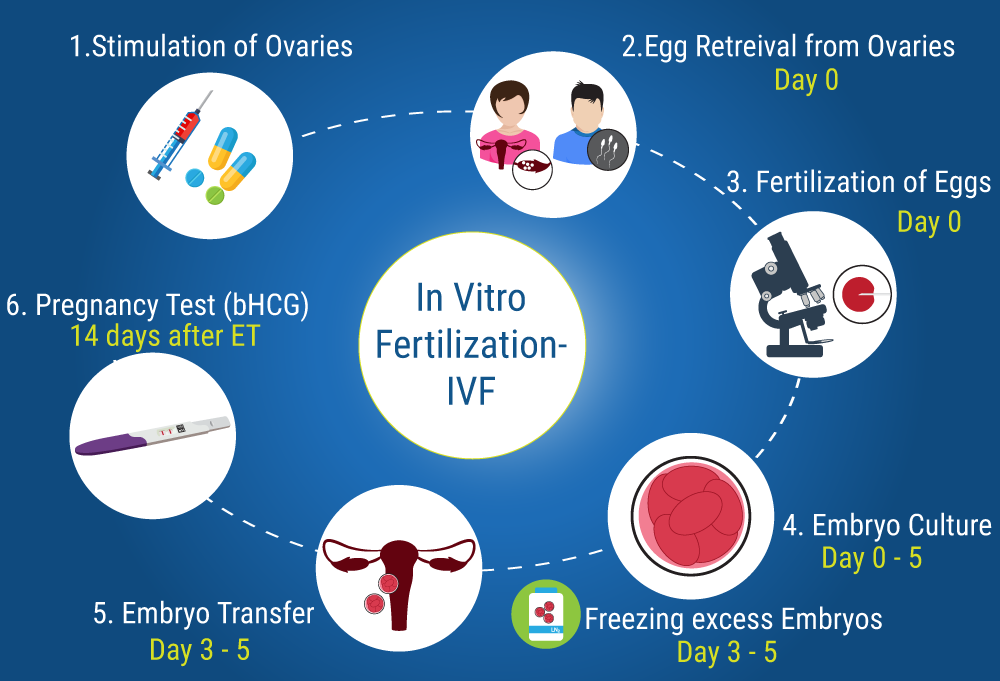
What is IVF ?
IVF is a process wherein an egg cell is fertilized with a sperm cell outside of the human body. IVF involves everything from fertilization to culturing of human gametes (egg and sperm cells) in the IVF Lab. It is an umbrella term used for a wide range of services performed in the IVF lab. IVF is also a method of fertilization where sperm is placed in the close vicinity of eggs within a petridish.
The internet is flooded with queries like :
- What is IVF treatment ? or
- What is IVF procedure ?
- What is IVF Pregnancy ?
- What is Test Tube Baby procedure?
- How is IVF done ?
We are sure that there is no dearth of information on google that explains the procedure in details. In our attempt today, we will try to cover a brief history of the following:
- Why IVF is needed or who needs IVF ?
- What is the cost of IVF ?
- How IVF procedure done ?
- What is the success rate of IVF ?
In some other blog we also try and cover about how is IVF pregnancies different from natural pregnancies.
What is IVF treatment or IVF Procedure ?
IVF or In vitro (Vitro is Latin for glass) fertilization (IVF) is a form of assisted reproductive technology (ART) during which the process of fertilizing eggs with sperm is done outside of the human body. During the IVF procedure, the eggs are fertilized, and the resulting embryos are placed in the woman’s uterus, hoping for a successful pregnancy. The entire process of retrieving eggs from the human body, fertilizing them, and culturing it into an embryo is done within an IVF Lab of an IVF Clinic.
Since the function of the fallopian tube, which is to provide a site for fertilization and an environment suitable for the growth of the first few days of the fertilized zygote, is performed in an IVF lab, this process was also called the Test Tube Baby process. However, these days it is called IVF.
IVF Labs require state of the art equipment and good embryologists. Thankfully, our IVF centre in Indore is among the best in the city and is equipped with a high-end lab and excellent Embryologist.
Video showing the entire IVF Process that happens in IVF Lab
What is Test Tube Baby Procedure ? Is it same as IVF ?
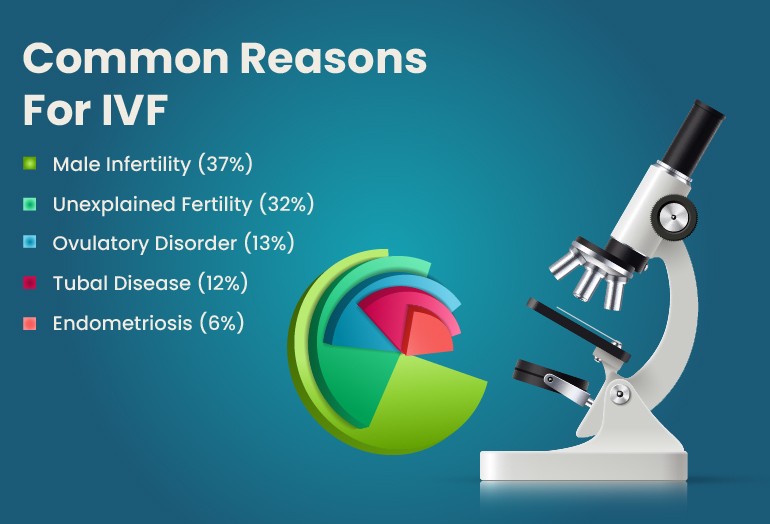
When is IVF procedure recommended ?
IVF is not the first line of infertility treatment for patients who suffer from fertility issues.
The first step of infertility workup for a couple includes a basic fertility screening test for both partners. Such tests are usually available in any IVF Clinic. in Indore. However, many IVF Centers in Indore outsource such fertility tests to other pathology or sonography center. Try to get the fertility test done at any standard IVF Center so that the reports are standard.
Our center is one of the best IVF centers in Indore regarding fertility testing, reporting on time, and IVF results. People have rated us one of the best IVF centers in Indore due to our past performance and the overall rating on Google and other channels.
For men, the basic fertility test is Semen Analysis or Semen test, often colloquially called Sperm Test. Semen Analysis is done at any IVF center to assess the sperm count or sperm concentration along with sperm motility and sperm morphology. If your city does not have any good IVF center or IVF Clinic, try to get the test done in a nearby city with a good IVF facility.
Main Fertility Test for Men:
The basic fertility test for men is Semen Analysis or Semen test often colloquially called Sperm Test.
Semen Analysis is done at any IVF center to assess the sperm count or sperm concentration along with sperm motility and sperm morphology.
If your city does not have any good IVF center or IVF Clinic, try to get the test done from a nearby city with good IVF facility.
Main Fertility Test for Women :
Baseline pelvic ultrasound, preferably transvaginal scan.
An ultrasound is performed to assess ovarian reserve status as well as uterine structure of the female. The findings of the USG will reveal if there are any visible uterine anomalies/defects.
Tubal Patency Test for Women
Some females will also be asked to get their tubal patency assessed using either HSG or diagnostic laparoscopy test.
Tubal Patency test is performed to assess if fallopian tubes are open or closed.
This test is usually not done in most IVF Clinics in Indore as it requires X-Ray machine. You may be asked to visit any Pathology lab with X-Ray facility for the test.
Diagnosis on basis of Test Results:
Once the infertility test results are out, IVF is suggested by the IVF specialist for the following causes of infertility:
- Damaged or blocked fallopian tubes (can be caused by Pelvic Inflammatory Disease or prior reproductive surgery or if tubes are tied previously – tubal ligation)
- Severe Endometriosis or mild to moderate Endometriosis not responding to IUI.
- Advanced reproductive age, as a time to conception, is critical and pregnancy rates with other therapies are low.
- Severe male factor infertility (sperm counts or sperm motility is low)-ICSI is recommended.
- Severe Asthenozoospermia – very poor motility of sperms leading to male infertility.
- Azoospermia – Nil Sperm report. IVF needs to be done with ICSI and TESA
- Unexplained fertility problem in which other modalities have not been successful, including multiple (3 to 4) cycles of IUI.
How is IVF Procedure done?
IVF treatment is not just one simple procedure, but a series of steps interlaced with each other and done over several weeks (usually 6 weeks). The steps involved in IVF treatment that are typically followed by IVF doctor are:
- STEP 1 – Stimulating the ovaries – Super Ovulation
- STEP 2 – Collecting the eggs – Egg Retrieval
- STEP 3 – Fertilization of eggs – Insemination and Fertilization
- STEP 4 – Embryo Culture
- STEP 5 – Embryo Transfer
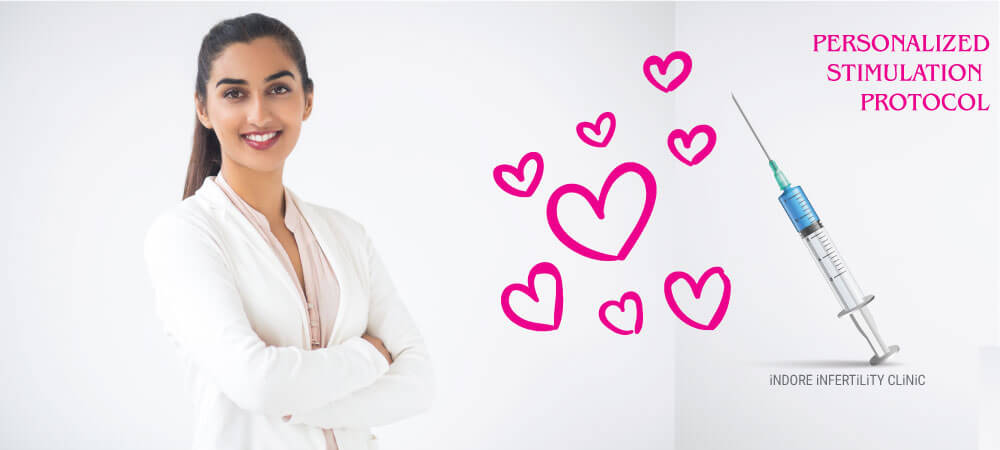
Step 1: Stimulating the ovaries
Hormones (Fertility Drugs) are usually given by the IVF Specialist to stimulate the ovaries to produce more than the usual one egg per cycle. This is done to enable the collection of several eggs.
The development of the eggs is monitored by blood tests and Trans Vaginal Ultrasounds that ensure eggs are collected by at precisely the right time.
These drugs used to stimulate the ovaries are one of the main contributors to IVF Cost. There are many manufacturers of IVF drugs and it is not fair to compare one manufacturer to the other. However all standard companies produce high quality IVF injections and can be administered safely.
Our IVF center in Indore specialized in highly personalized stimulation protocols for the patient, depending on their medical history, age and previous IVF cycle results.
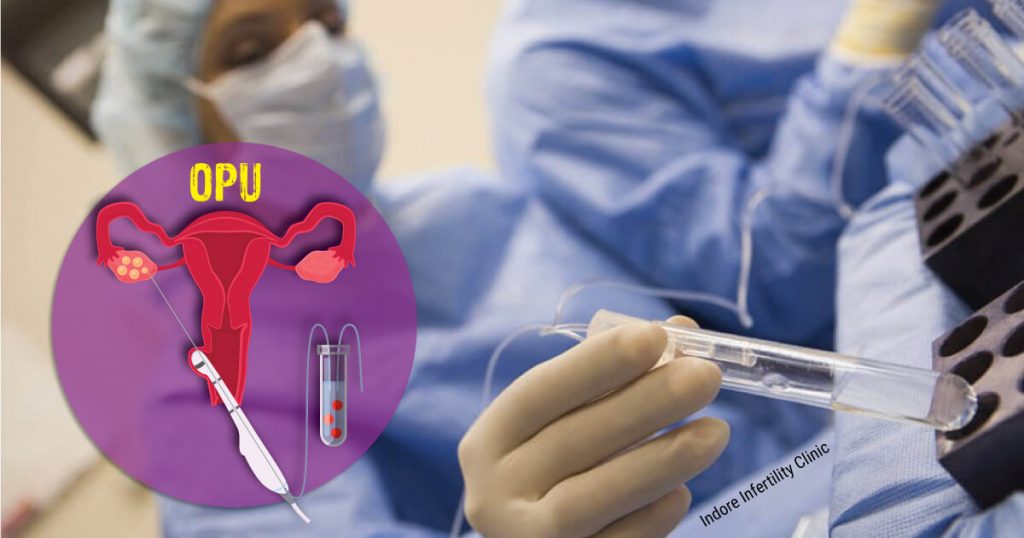
Step 2: Egg Retrieval
During the IVF Cycle, at the time of ovulation the eggs are collected in a process called Ovum PickUp or Egg Collection. An ultrasound probe is placed within the vagina while the woman is under light sedation. The ultrasound monitor shows where the follicles are within the ovaries.
The needle is connected to a suction device, which pulls the eggs and fluid out of each follicle, one at a time. The procedure is repeated for the other ovary. The woman may have some cramping after the procedure, but it usually goes away within a day.
If a woman does not or cannot produce any eggs, donated eggs may be used.
The Ovum Pickup if done by experienced and best IVF doctors, results in collecting of all the mature follicles within the ovary. This skill needs good amount of surgical acumen and practice. If done by inexperienced IVF specialist, it may lead to collection of less number of mature eggs and hence impact the IVF success rate.
Try to locate an IVF specialist in Indore who has decent amount of experience in terms of IVF cycle as the skill of Ovum pick up gets better with practice.
Step 3: Insemination and Fertilization
On the day of egg collection, the male partner provides a sample of semen. As a precautionary measure a semen sample of the husband is taken at the onset of stimulation and Cryopreserved.
The best IVF center in Indore prefer to cryopreserve the husband’s sample before the day of OPU. This safeguards the couple from any mishap in producing semen sample on day of OPU.
In a standard IVF treatment, the semen and best quality eggs are placed together in an environmentally controlled chamber called the incubator. This process of mixing the egg and sperm is called insemination. The sperm usually enters (fertilizes) an egg a few hours after insemination.
Step 4: Embryo culture
When the fertilized egg divides, it becomes an embryo. An embryologist will regularly check the embryo to make sure it is growing properly. Within about 3-5 days, a normal embryo has several cells that are actively dividing.
Couples who have a high risk of passing a genetic (hereditary) disorder to a child may consider Pre-Implantation Genetic Diagnosis (PGD) or PGT. The procedure is done about 3 -5 days after fertilization. An experienced Embryologist from a good IVF Clinic usually removes a few cells from each embryo and screen the material for specific genetic disorders. Pre-implantation genetic testing can help doctors decide which embryos to implant, which decreases the chances of passing a disorder onto a child.
The best IVF center in Indore usually own a Laser that helps in performing Embryo Biopsy.
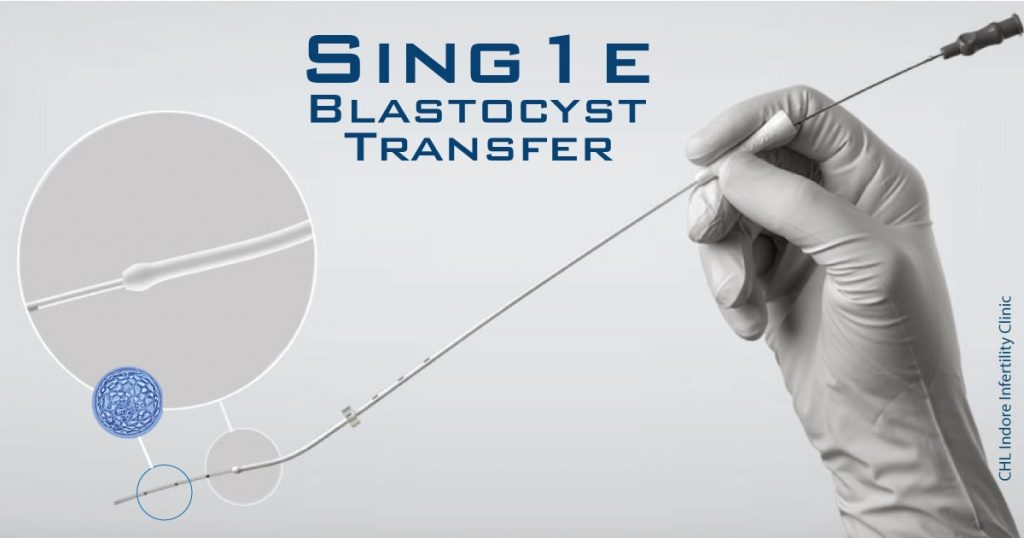
Step 5: Embryo Transfer
Once the embryos have grown to a predetermined size in the IVF Lab, one to a maximum of three embryo’s will be transferred back to the woman’s womb 3 – 5 days after egg retrieval and fertilization. During this procedure your IVF Doctor will pass a very fine plastic tube (catheter) through the cervix and into the uterine cavity under ultrasound guidance. Pregnancy results if an embryo implants in the lining of the womb and is able to grow successfully.
Embryo transfer is very similar to a Trans Vaginal Ultrasound, is generally painless and usually involves no anesthetic. More than one embryo may be placed into the womb at the same time, which can lead to twins, triplets, or more. The exact number of embryos transferred is a complex decision that depends on many factors, especially the woman’s age. It is best to have this discussion with your IVF specialist before the day of Embryo Transfer.
The best IVF clinic will most frequently transfer a single Blastocyst to a patient. There are many benefits of transferring a single blastocyst. Please read our blog to understand the process of Elective Single Embryo Transfer better.
Unused embryos may be frozen and implanted during a later Frozen Embryo Transfer Cycle or donated at the will of both partners at a later date.
Two weeks after the Embryo transfer, blood is taken and tested to determine if the woman is pregnant.
The blood test that is done to confirm pregnancy is called Quantitative Serum b-HCG test. Make sure that you get the quantitative test done that mentions the quantity of bHCG in blood
In recent times a newer protocol of IVF is being popularly used, it’s called a Freeze All IVF Protocol. In this protocol the Embryo’s are NOT transferred in the same cycle. Instead the Emrbyo’s are frozen and Embryo Transfer happens in the subsequent natural cycle of the patient.
What is IVF Pregnancy ?
When pregnancy is achieved using IVF Procedure, it is called IVF Pregnancy.
The only difference between care during pregnancy and normal pregnancy and IVF pregnancy would be during the first trimester, beyond which both pregnancies are treated similarly. Most of the patients and their family members unnecessarily subject them to bed rest and limited movement just because the pregnancy has resulted from IVF. It is not necessary.
What is the cost of IVF Cycle at Indore ?
IVF Cost is dependent on many factors. It is not a one price fits all.
Cost of an IVF Treatment cycle is dependent on following factors:
- Age of patient
- Type of Infertility (Whether patient had conceived previously or not)
- Reason for infertility if already known
- Result of previous attempts to IVF, if patient has attempted IVF
Also, it is important to know that not all centres charge equally, usually good IVF Center’s include the following within the IVF package cost:
- Cost of all Consultation with IVF specialist
- Cost of all Ultrasound that occur during the IVF cycle or initial diagnosis and workup.
- Cost of all Semen analysis during the IVF Cycle
- Cost of Semen Freezing during an IVF Cycle
- Cost of trial transfer on patient during IVF cycle
- Cost of all drugs and injections used for ovarian stimulation during the IVF cycle
- Cost of all IVF Lab disposables and media used during the IVF Cycle
Typically IVF centres may not include the following within the cost of their IVF package:
- Cost of blood investigations done during the Infertility diagnosis.
- Cost of blood test for hormonal estimation done during an IVF cycle
- Cost of anesthesia during an IVF egg retrieval. (Some clinics include this within IVF package)
- Cost of medication after the embryo transfer. (Some clinics include this within the package, some don’t)
- Cost of freezing the embryos. (Some clinics include this within their package, however most clinic’s don’t)
Some IVF Centre’s charge the following items over and above their IVF package:
- Blastocyst Culture
- Freezing of extra Embryos
- Sperm Freezing
IVF cost in Indore Infertility Clinic includes the Blastocyst Culture and Embryo Freezing cost upto one year.
What is the cost of IVF in Indore ?
IVF Cost in tier two city like Indore is lower than cities like Delhi and Mumbai usually. The cost of IVF in Indore is in the range of 1 Lakh to 1 Lakh 75 thousand when IVF is planned with self eggs and sperms.
Why is IVF cost different for different patients?
As explained above, the cost of IVF is majorly driven by the age of patient and ovarian reserve, hence it is best to let the IVF Specialist review your case history and reports once before he or she is ready to quote the cost of IVF cycle.
You can share your reports on whatsApp with us to understand the exact cost for your case.
Click the whatsApp button below to share reports.
What to expect during IVF Treatment ?
IVF requires a significant physical, emotional, financial, and time commitment. Stress and depression are common among couples dealing with infertility. Studies have shown that reducing stress levels can drastically improve the results of IVF. Hence it is very important to keep a positive attitude during the treatment.
From start to end a typical IVF treatment cycle lasts upto 6 weeks. During these six weeks, based on the Steps indicated above, a woman should expect the following:
- Multiple visits to the IVF Clinic in Indore.
- Injecting or Ingesting Fertility Drugs at pre decided dates by the IVF Specialist.
- Multiple Trans vaginal Ultrasounds to monitor the follicles (Follicular Monitoring)
- An outpatient procedure for Egg Retrieval or OPU which usually is done under General Anesthesia
- An outpatient procedure for Embryo Transfer
- Daily Progesterone dose either orally or as an injectable or as a vaginal gel to help the embryo implant.
- A two week time period to patiently wait before you can perform a pregnancy test
- Lots of Positive thoughts and a heart to deal with a Cycle failure since not all IVF Cycles are successful
What are the Risks of IVF ?
There is no clear evidence that infertility medicines and IVF injections, if used properly, increase the risk of birth defects or cancer.
Some of the risks during an IVF cycle are :
- Ovarian Hyper Stimulation Syndrome or OHSS
Occasionally, during Ovarian Stimulation too many follicles develop and the levels of the hormone estrogen rise too high, causing a condition called Ovarian Hyperstimulation Syndrome (OHSS). This is an unpleasant experience, which may include marked abdominal swelling, nausea, vomiting and diarrhoea, lower abdominal pain and shortness of breath. OHSS is rarely severe enough to require hospitalization. - Twin pregnancy or multiple birth : If more than one embryo or blastocyst is transferred during an Embryo Transfer, there is always a risk of multiple birth or twin pregnancy. Multiple gestation always has a risk of premature delivery.
- Complications during Egg Retrieval or Ovum Pickup – Even though this is a very rare case and hardly a risk at good IVF clinic’s with experienced IVF specialist who have good surgical skill, There is however a theoretical risk (very rare) of damaging other organs, or causing infection or bleeding, with the collection needle.
- Premature Delivery or Premature Labor – IVF may result in slightly increased rate of premature delivery as most of the IVF patients are usually above the age of 35 years.
- Ectopic Pregnancy – The chances of ectopic pregnancy which occurs when the embryo implants at places other than the uterus, is to the order of 2 % to 7 % after an IVF Embryo Transfer. Many studies have confirmed that the rate of ectopic pregnancies after IVF is similar to the rate of ectopic pregnancy after natural conception.
The best IVF center’s usually have very low OHSS rate as well as negligible complication rate post egg retrieval as over the years IVF stimulation protocols have become very patient friendly.
What are the most common side effects of IVF ?
Side effects during ovarian stimulation:
The increase in the hormone estrogen can cause:
- Breast tenderness
- Slight nausea
- Dizziness
- Slight abdominal swelling.
- Abdominal Pain
- Swelling at site of injection
Side effects after the ovum retrieval:
- Abdominal pain and discomfort
- Bloating due to water retention
Side effects after Embryo Transfer:
The hormonal medication given prior to Embryo Transfer may cause some of the following side effects:
- Constipation
- Water Retention
- Cramping
- Breast Tenderness
- Spotting
What is the success rate of IVF?
According to the Society of Assisted Reproductive Technologies (SART), the approximate chance of giving birth to a live baby after IVF is as follows:
- 41-43% for women under age 35
- 33-36% for women age 35 – 37
- 23-27% for women ages 38 – 40
- 13-18% for women over age 41
The main potential factors that influence pregnancy and live birth rates in IVF have been suggested to be maternal age, duration of infertility and ovarian function. Optimal woman’s age is 23–37 years at time of treatment. In women of age more than 38 years, if sufficient number of their own oocytes are not available, IVF with oocyte donation is a good option. Reproductive history of female also plays an important role in IVF success, women who has given birth previously stand a better chance at succeeding with IVF attempt.
Please note that with each passing year efficiency and safety of IVF is increasing which eventually leads to improvement in take home baby rate.
What are the reasons for IVF Failure ?
IVF has a reasonable rate of success. Overall, approximately 35 percent of IVF cycles will end in a live birth after single attempt, and the cumulative chances of success are higher when more than one cycle of IVF Embryo Transfer is done.
However, an individual’s chance of success depends on several factors like:
- Woman’s age
- Cause of infertility
- Quality of eggs and sperm.
- Lifestyle factors like smoking and exposure to industrial toxins.
- Capability of the IVF Lab to handle extended Blastocyst culture.
- Skill of an Embryologist to handle embryo freezing and warming.
Treatment approach. Also with newer protocols like Freeze All IVF Cycle, the chances of conception are as high as 70%.
It can be difficult to deal with the emotional highs and lows of Infertility Treatment. This is especially true if the woman (and her partner) have been trying to conceive for a long time or if there are any underlying problems in the couple’s life (eg, medical, family or partner, job, financial).
How soon after Failed IVF can I try again ?
Medically there is no guidelines that states the number of days one should rest before trying another IVF cycle. So if the patient wants they can try IVF the very next cycle unless they have any specific medical condition that limits them from doing so.
Discuss your options with your IVF specialist and decide your next IVF cycle based on your comfort.
Please refer the following Quick Reference Chart for knowing the cost of IVF Cycle at our centre
Cost of IVF
How to prepare for an upcoming IVF cycle ?
By the time a patient has been advised to undergo IVF cycle, they must have already undergone a battery of fertility tests to evaluate their reproductive health. These tests include:
- Advanced Semen Analysis of the Male to assess sperm count, sperm concentration, sperm motility and quality.
- Test for Ovarian reserve for female by both hormonal estimation and AFC count by ultrasound
- Ultrasound evaluation of Uterine cavity.
- Tubal patency test by HSG or laparoscopy.
- DNA Fragmentation Index test (DFI) for some men with poor sperm quality.
- Genetic screening for partners in some cases.
After the results of the above test, the IVF specialist may put the female or both partners on dietary supplementation for few weeks to improve the quality of gametes.
Here are some tips for preparing yourself for an upcoming IVF Cycle, please read our detailed blog on the same for more information :
- Maintain a healthy lifestyle for few weeks prior to IVF. Sleep well, maintain a healthy routine.
- Exercise moderately, loose weight if you have high BMI. Maintain mobility.
- Stay relatively busy to keep your mind Off the IVF stress.
- Eat well. A healthy balanced diet always works.
- Have the right expectations for the IVF Cycle. It is not a 100% guaranteed treatment.
Commonly Asked IVF Questions
IVF is a type of treatment done to help infertile patients to get pregnant and deliver healthy babies. During IVF the process of fertilization is done outside the human body within an IVF lab.
IVF cost is dependent on many factors like the patient’s age, the underlying cause of infertility, and response to ovarian stimulation. Typically IVF cost ranges from 1 lakh to 1 lakh 50 thousand in Indore. The actual cost can only be calculated after assessing the patient’s reports.
It is very important to assess the reason for IVF failure before trying another cycle. IVF can fail due to poor quality gametes (both poor sperm and poor eggs), failure to produce Blastocyst, failure of implantation, or miscarriage after implantation.
Knowing the reason for failure can warrant corrective action at each step. However, in case of very advanced maternal age or very low AMH with multiple failures, your IVF specialist may advise you to think about donor oocytes or donor eggs.
During an IVF process the health of the baby born is completely dependent on the health of embryo and the course of pregnancy.
Instead of being fixated on chances of abnormality, it is best to understand the following things:
IVF treatment is not an elective treatment, it should be indicated and hence we should know that only couples who cannot conceive naturally will undergo IVF. So since there is not alternative to IVF our focus should be on what can be done to make it safer:
- Quality of eggs and sperm depend on your lifestyle and age. So maintain a healthy lifestyle and dont be too late.
- Choose a good IVF center so that you know that they have a good IVF lab which consistently delivers best IVF success rate.
- Choose to transfer only one embryo, this will ensure an uncomplicated pregnancy.
- Monitor pregnancy well and stay away from stress.
IVF treatment cost is inclusive of the cost of follicular monitoring, cost of drugs for stimulating the ovaries, cost of semen processing and freezing, cost of disposables and media used in the IVF lab, and above all cost of the time that an IVF specialist doctors and embryologist gives for your case.
Typically IVF treatment cost less in Indore as compared to metros however since the cost of IVF drugs and Media are costlier in non-metro cities because of transportation charges, the cost of IVF cycle in Indore is typically about 15% cheaper than in Metros.
An IVF cycle can cost anywhere between 1 Lac, to 1 Lac 50 thousand if opted with self gametes.
Average number of eggs for patients under 35 years of age with regular ovarian reserve is about 8 to 10. So per IVF cycle we expect on an average 8 to 10 eggs. However for patients above 35 years of age and or poor ovarian reserve (low AMH) the average number of eggs per cycle could be as low as 5 or less.
If IVF has resulted in successful pregnancy, and progressed to the second trimester then the chances of taking home a healthy baby is very high, actually it is as high as chances in normal pregnancy.
After successful implantation of IVF embryos which is detected by bHCG blood test, the pregnancy is monitored by ultrasound to assess fetal heart beat. The chances of miscarriage in IVF pregnancy before establishment of cardiac activity is slightly higher (before 8 weeks). However the miscarriage rate after establishment of cardiac activity is similar to that of natural pregnancy.
It is worthwhile to note that multiple embryo transfer that results in twin or multiple pregnancies, always has a higher risk of miscarriage. So it is always best to opt for single Blastocyst transfer. To know more, please read the following blog:
https://www.indoreinfertilityclinic.com/elective-single-blastocyst-embryo-transfer/
Fertility Drugs are researched over years and show no significant rise in abnormality in the resulting baby. Nor does the ultrasound waves cause any abnormality. IUI is very safe if done under proper guidance from good IVF doctor.
Multiple pregnancies like twin pregnancy is a result of transferring more than one embryo to the uterus. Any good IVF centre will transfer only single good blastocyst which will result in a single pregnancy. However in rare incidences even a single blastocyst / embryo can result in a monozygotic twinning (identical twins).
On an average a patient would need to administer 12 days worth of injections. These injections are usually intra muscular. Even though it may seem a lot, but considering the out come of a successful IVF treatment, it is definitely worth the prick. You may want to read the following article on the same:
IVF doctors will first get a few basic investigations done to assess the reason for infertility. Based on the outcome of the result, doctors will decide on the course of treatment. For male partner the investigation ordered is Semen Analysis. Female partner is advised baseline ultrasound to assess uterine cavity and or follicular monitoring.
